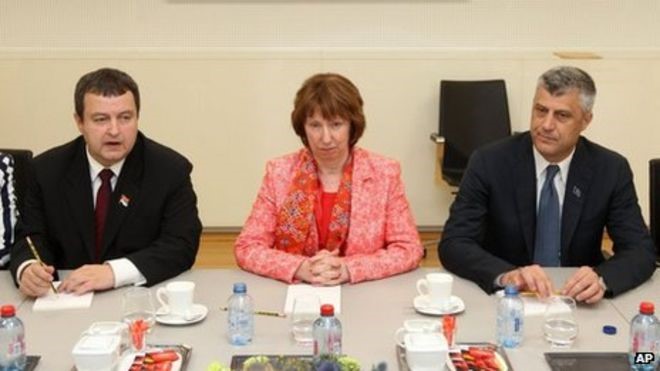Local Elections/Establishment of Serb-majority Municipalities
Kosovo and Serbia reached the First Agreement of Principles Governing the Normalisation of Relations (known as Brussels Agreement) on 19 April 2013.
Among the issues that they have agreed on, it was also the issue of the legal establishment of the four Serb-majority municipalities in northern Kosovo: Mitrovicë/a North, Zvečan/ Zveçan, Zubin Potok, and Leposavić/ Leposaviq.

This meant holding the first local elections, in November 2013, and building the local institutions in these municipalities almost from scratch, under the jurisdiction of Kosovo. This would, therefore, increase the trust, confidence, and legitimacy of the local population.
The establishment of Serbian municipalities and the organizing of elections (in the same municipalities) under Kosovo’s jurisdiction, was viewed differently among the parties.
For Belgrade, it would create the conditions for the establishment of the Association/Community of Serb-majority Municipalities (ASM/CSM); which is part of the same agreement. But for Pristina, it would ensure the legal functioning of all municipalities in Kosovo (extending its authority in that part of the territory) and the integration of northern Serbs.
Before this agreement, Kosovo Serbs had largely ignored Pristina-led political processes and did not participate in Kosovo elections. Particularly, Serbs from northern municipalities were reluctant and not responsive to integration initiatives that came from Pristina. Rather, relied on Belgrade-funded institutions for employment and public services, opting to stay tied to the Serbian system.
On 23 May 2013 both governments adopted the implementation plan; according to which, by the end of October, local elections would be held.
Following the adoption of this plan, Belgrade dismissed the mayors of all four northern municipalities and decided to dissolve the existing municipal structures in the northern part of Kosovo that were established and fully functioned under Serbia’s legislation and control.
The first local elections in the northern municipalities were held in November 2013 and were facilitated by the OSCE, in accordance with Kosovo legislation. Kosovo agreed not to show state symbols, emblems and other state elements on the ballot boxes because Kosovo Serbs would not take part in any election process that indicated it was the elections of the independent Kosovo.
The elections were legitimized by international actors; such as the EU Observation Mission, as free and fair. In other words, the Kosovo Central Election Committee (CEC) had, for the first time since the war, registered and certified all political entities and participants in the municipal elections in the northern part of Kosovo. Since then, despite difficulties, citizens have participated satisfactorily in Kosovo’s local and central elections.
In 2014, an official inauguration of the municipal bodies in all four municipalities and adoption of the municipal statues in accordance with Kosovo laws was completed. The aim was to abolish the Serbian municipal structures; something that is not achieved yet.
This agreement has:
- Paved the way towards normalization and democratization in this part of the country; For the first time since 2008, northern Kosovo Serbs participated in local elections. Two subsequent local election cycles were held in 2013 and 2017. In 2017, elections were held completely in accordance with Kosovo law, including state symbols and emblems on the ballots.
- Established functioning Kosovo municipalities, with Mayors and local assemblies. Local elections were followed by three rounds of subsequent elections for Assembly of Kosovo in 2014, 2017 and 2019, in which, all Kosovo Serb citizens participated.
- And established regular communication between Kosovo Ministry of Local Government Administration and the four northern municipalities.
However, as a result of the dispute in the implementation of the Brussels agreement, particularly on ASM/CSM, certain obstacles remain:
- The presence of parallel (administrative) structures in this area, which still operate based on the Serbian laws and are funded by Serbia;
- Not all departments are fully functional; only the Department of Finances, Administration, Urbanism and Spatial Planning and Social Welfare are staffed and operate properly;
- The education system including the University of Mitrovicë/a North and health system still function under the Serbian system and its parallel structures;
- And lastly, there is no consensus as to the municipal symbols, seals and logos to be used by the new municipalities. So far they are still operating without an official logo and only respect the placement of Kosovo symbols when communicating with Kosovo institutions, but when communicating with Serbia, they use Serbian logos and seals.


